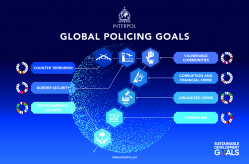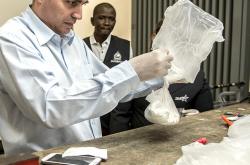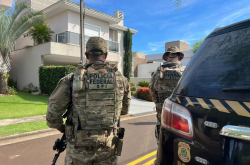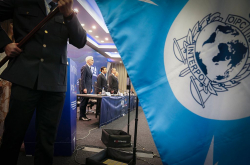OHRID, North Macedonia - Three days of discussions between senior police officers from 53 countries in Europe and the wider INTERPOL membership have led to a call for greater coordination to effectively combat the region’s most pressing security threats.
INTERPOL’s 50th European Regional Conference saw delegates adopt recommendations to more closely align international efforts in a range of strategic areas, including counterterrorism, illicit trafficking and the sharing of police data.
The meeting took place as Europe faces a historic peak in the production of illegal narcotics, which has strengthened organized crime groups and led to an accompanying rise in violent crime across the region.
“The globalized nature of crime means that our respective borders are only as strong as our weakest links,” said Stephen Kavanagh, INTERPOL Executive Director of Police Services.
“The data contributed to INTERPOL is a contribution not just to national or regional security, but to global security,” Mr Kavanagh added.
No alternative
A panel featuring leaders from European Union law enforcement bodies Europol and Frontex focused on the need for greater alignment between INTERPOL and regional policing bodies, to build a global model for a police data-sharing architecture and ensure Global Policing Goals are aligned with the United Nations Sustainable Development Goals.
“The most important part of international police cooperation is information exchange,” said Peter De Buysscher, INTERPOL Vice President for Europe, who chaired the conference. “We need a global data-sharing framework. There is no alternative.”
The volume of data in policing has increased dramatically in recent years, opening up new investigative opportunities but also posing data management challenges. At the international level, there is a crucial need to minimize duplication and increase alignment so that investigators or frontline officers have access to the right information when they need it.
Joint initiatives such as FIELDS, which brings together capabilities from INTERPOL and Frontex into a unified system that helps border officials spot fraudulent travel and identity documents, was highlighted as a concrete example of successful alignment.
What drug traffickers fear
European police leaders also discussed the rapidly evolving state of play with regards to drug trafficking and the organized crime groups behind the illicit trade.
The adaptability of networks was identified as a key challenge to enforcement, with groups often working across national and regional lines to secure ever-greater profits. To effectively combat such networks, police must be just as adaptive and even more collaborative.
Recent successes in INTERPOL initiatives such as the I-CAN project targeting the ‘Ndrangheta mafia group, closely involved in bringing cocaine from Latin America into Europe, were highlighted as examples of innovative international police cooperation.
Launched in 2020, I-CAN has already produced results that have “exceeded expectations”, according to one conference speaker, with more than 40 high-profile arrests and tens of thousands of pieces of intelligence exchanged.
“This is what drug traffickers fear,” said one closing speaker. “All of us in the same room, working together, exchanging information and breaking down walls.”









